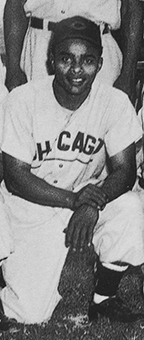By Charles Hallman
(Source: 90 MSR)
Another View
Third in a series
The year 1947 is often seen as a historical watershed moment in American history when Jackie Robinson joined the Brooklyn Dodgers as the first Black Major League Baseball player. Some use this as the start of the Civil Rights Movement in this country.
Stay in the know. Sign up for our newsletter!

Get your daily dose of community news, info, events, exclusive deals and more!
Alan Cohen of the Society of American Baseball Researchers (SABR), in his presentation at the group’s convention in August in Minneapolis, said, “Most of minor league baseball remained closed to Black players” for several years after Robinson came into the Major Leagues.
However, a year before Robinson’s historic debut, a 1946 state baseball game in Zumbrota, MN featured a Black pitcher named Al Sayler. But he actually was Gready “Lefty” McKinnis, a former Negro Leagues star who was banned from the league for playing in the “outlaw” Mexican League.
Zumbrota News publisher Dave Grimsrud wrote in a June column about this overlooked historic feat. He included excerpts from an account his paper published by Ed Davis on August 2, 1946: “Zumbrota’s 5-3 victory over Pine Island…the losers were not a bit pleased when they discovered that a Black gentleman from parts unknown was in the box for the locals.”
Gready McKinnis (1913-1991) was born in Union, Alabama and later played on three Negro Leagues clubs from 1941 to 1944 as well as two integrated minor league teams. He was a two-time Negro American League All-Star and led the league in winning percentage as a pitcher in 1941. He also was one of a few men ever to beat legendary Satchel Paige. But because of his race, along with playing in the Mexican League, McKinnis was ostracized by Major League teams.
McKinnis’ place in Minnesota state history occurred in 1947 when he became the first Black player in the Minnesota State Baseball Tournament. Named tourney MVP, McKinnis pitched for Rochester and won all three of his team’s victories, losing only in the championship game, and finished with a 3-1 mark and 39 strikeouts.
He struck out 16 Chaska batters in the title game.
Now that Major League Baseball has officially re-cognized Negro Leagues players statistics, McKinnis’ stats are now on record. “We are proud that the official historical record now includes the players of the Negro Leagues,” stressed MLB Commissioner Robert Manfred.
Carl Rogan, grandson of Wilber “Bullet Joe” Rogan, a three-sport local high school athlete who played for Kansas City of the Negro Leagues, told me, “It gives some credibility to what has happened in the past.”
Although Wilber Rogan is in the Baseball Hall of Fame (1998), his baseball stats weren’t officially accepted until now. Thanks to MLB and SABR, Rogan’s statistics now have him in the top 25 batting averages “of anybody that’s ever played. That to me is just remarkable,” added Carl.
“I still want people to understand that the Negro Leagues story is much larger than the statistics,” stressed Negro League Baseball Museum President Bob Kendrick. “The stats will never tell that story, the story of what they endured and how they persevered.
“We need to make sure that we seize this moment and honor them for not what they just gave baseball, but what they gave this country,” said Kendrick.
There are many Black baseball players’ stories still to be told, and such players as McKinnis should be duly noted and forever recognized.
Next – Who is John Donaldson and why isn’t he in the Hall of Fame?
Special thanks to Zumbrota News-Record’s David Grimsrud for allowing us to use excerpts from his June 26 column and furnishing us with archival photos of Gready McKinnis.

